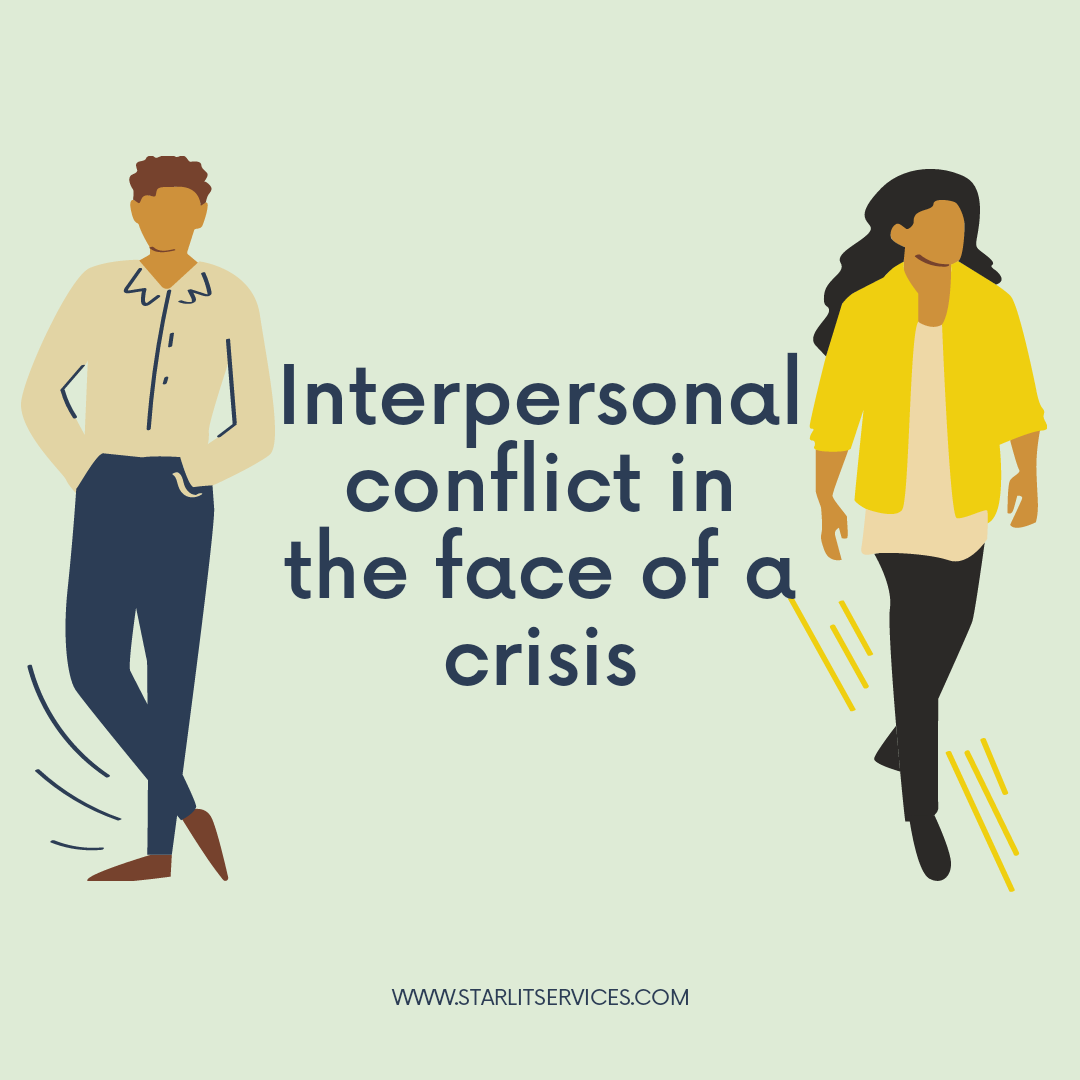(An understanding of the effective ways to manage conflict within the home during the course of the COVID- 19 breakout)
During the current scenario, a majority of us are spending most, if not all of our time at home. The options of ‘escape’ as a way to avoid conflicts, that were accessible earlier are now out of reach. In addition, there are very low levels of predictability of the future circumstances. To top it all, there is a conglomeration of people living in limited spaces. Now more than ever, it becomes crucial to build a system through which arguments, disagreements that may potentially lead to interpersonal conflicts can be dismissed.
Conflict V/s Disagreement

A conflict is different in many ways than a mere disagreement. In a conflict, both the parties may perceive a threat, even if there isn’t a real or immediate threat. This perceived threat could be the threat to their freedom of opinion or freedom to fulfill their needs.
It is often accompanied with emotions such as frustration, hostility and distrust. One would prefer his/her opinion to prevail more than the other person’s. This then leads to an uncomfortable environment for both the parties.
Disagreement usually last for a shorter duration and may be limited to only one or two topics. However, conflict extends and spills over most aspects of the relationship and creates a rather toxic environment for all.
We are all entitled to our opinions, perspectives and priorities, even as we continue to stay at home with our family members. Neither of these priorities/ opinions are wrong or right. One may want to weigh in their choices as compared to that of others. But from a subjective point of view, there is no way one can prove their choice / perspective/ reason/ priority to be superior than anyone else’s.
To carry on with interpersonal conflict management within our homes at this time, it is helpful to first understand the nature of conflicts. Any difference of opinion, perspectives, thought processes can be a source of conflict.
Major causes of conflict and what we can do to manage conflict effectively:
1. Personal space and boundaries-
Given the current situation of uncertainty and stress, it is very important to address this issue of maintaining personal space. For two reasons mainly- One – those of us who would easily spend 8-10 hours outside of home are now staying in. This has directly affected the personal space that people had in a family. The resources (space, gadgets, equipment) are the same / limited , however the number of people and their frequency has increased a lot.
Secondly, the generational incoherence has widened to a great extent in the past decade. Every generation has very different ideas about personal space and protecting boundaries. These differences may lead to disagreements. Since most of the youth is not ‘working from home’, they may require clearer boundaries.
What can we do to avoid conflicts?
- One of the ways to avoid conflict in family is to set clear boundaries for yourself. Remember to also respect the boundaries set by other family members. These boundaries may look like setting specific time for work and self-care. This is especially important for the population group of the care givers (parents, health care workers etc.)
- Physical space is crucial as well. Those who do not have a room to themselves should let the family know that even if they are physically in close proximity, they would prefer to have a specified time out wherein their physical presence should be ignored. You could be in the same room or on the same couch, but would like to have that time just to yourself. This helps in zoning out and catering to your own thoughts and tasks without interruption.
- We are all facing challenges in maintaining the same pace of work as we had before the crisis. It is natural and humane. Discussing boundaries with the other members at home is always helpful in minimizing chances of a family conflict.
2. Inability to differentiate between how a person is behaving now vs otherwise:
There is no doubt that this is a difficult time and most of us are overwhelmed with strong emotions. The occurrence of a conflict at this time is often a result of losing sight of what we already know about our family members otherwise, and their behavior in the present. Moreover, we tend to make a generalized judgement on the current responses we get. We fail to realize that they are themselves fighting their own battles and struggling to cope with the uncertainty around. This also leads to magnifying short term differences as long- term differences – further deepening the conflict.
Some questions we may want to ask ourselves to keep a check on what defines our perception of each member of the family may be:
- Is the other person doing well emotionally right now?
- Would this be the usual response from this person?
- Do I notice a change in behavior post the lock down?
- Have my ways of responding and behaving changed too?
- Do we need to take a time out instead of blaming and generalizing?
- How have we been responding to the crisis as family?
3. Unchecked anxiety:
As discussed earlier, we are going through a time of unpredictability. This, naturally has been a catalyst for a lot of anxiety for many people.
When any difficult emotion, be it anxiety, frustration or aggression is not regulated well, it leads to unhealthy repercussions.
These can leak to cause troubles at both physical and mental levels. There are a lot of internal struggles and emotional struggles that go unnoticed.
What can we do to avoid conflicts?
Listening circles can be a great way to express these emotional concerns. One can express to people who are close, who hold importance in our lives.
- It is important to have a space that is safe and comfortable. A space where we can share our feelings with our close ones in a most non-judgmental and empathetic way. This is very beneficial in regulating emotions.
- There are a lot of online platforms available that allow us to be a part of listening circles and groups. These provide the opportunity to share deeper emotions and the subjective experience of going through the crisis.
- Its is also a great way to address the deeper issues in the family. It is a great idea to sit as a group at a fixed time and systematically discuss the points of disagreement for the members. One can then strategically discuss the causes of interpersonal conflict and the possible way out.
4. Communication (rather, lack of it)-
Frankly, it’s very difficult to communicate politely and calmly when one is overwhelmed with difficult emotions and being civil is the last thing that crosses the mind for most people.
However, when we are in the midst of a conflict, arguing over matters that hold importance to us, the only thing that make matters worse is MISCOMMUNICATION.
The tone, volume and manner in which we communicate our feelings becomes important in deciding the direction of the conversation. It’s a good idea to give each other some space and let ourselves ‘cool down’ before we express. The same opinion when placed at the right time, in the right circumstances can really spin the situation around. Expressing ourselves clearly in a way that is empathetic and mindful of the emotions of others is essential. Always ask yourself:
- How can I express my needs in a way that is objective and clear?
- How can I be a bit more mindful of other individuals’ feelings and communicate myself clearly?
5. Dividing work at home and Distribution and management of resources (financial or otherwise):
The current crisis has put a lot of us in a financial dilemma. Added along side are responsibilities of work and home. At our disposal, we have very limited resources and support (domestic and financial). There is a definitive dilemma about redistributing resources and responsibilities that are in sync with needs of all members at home. This can be a topic of familial conflict as it may lead to one person or party feeling overburdened. This could be in the context of domestic responsibilities or financial duties.
This overload may sooner or later lead to a total burnout, given the difficult times. With different opinions and perspectives, it is natural to have disagreements with this specific decision-making process. But, the key is avoiding the mere disagreement escalate into a full-blown familial conflict.
What can we do to avoid conflicts?
- One can find it very helpful to have an empathetic point of view when engaging finances or resources related conversations. Empathy allows us to gain insight into the other individuals perspective and creates space for a middle path or negotiation.
- Along with empathy, another important factor is equity. It is the belief that we are all entitled to not only pick and work on our favorable choices, but do so by keeping in mind the responsibility to offer the same to the other person.
- Chores can be distributed and done diligently. This not only makes our home functional but also builds cohesion. Chores like washing dishes, cooking, mopping, dusting, doing laundry, buying grocery etc. evokes love and gratitude. And we all need it now more than ever.
- We need to mentally prepare ourselves to have a tough financial situation as a family for the coming few months. We all want to “live our life” right after the lock down. But unfortunately we need to be mindful of our expenditure. These are the times to discuss spendings as a family and not get stubborn about our own needs.
Conclusion
Irrespective of our previous experience within our immediate family, one can learn to effectively manage difficult conflicting situations. Some of us may have a tendency to avoid conflict at all costs. We’d rather suffer silently than bring up the tough topics to discuss. However, this may make things worse for both parties, because sooner or later we do end up confronting the situation.
“When the going gets tough ……”, the tough can take some time out. Somebody can move away from the situation or the physical setting. This allows them, as well as the other person, to get some time and emotional space. It gives the room to think with clarity and analyze the situation so that one can effectively find the solutions.
It is important to know
that the other person is not in the opposite ‘team’. It is always better to look at the situation with a perspective of ‘us’. Meaning, know that all members involved in a familial conflict are not pitting against each other. This results in a feeling of togetherness and unity.
We can certainly overcome conflicts by pooling our energies in finding a solution than magnifying the problem.
Lastly, hearty laugh can do wonders during these times. We usually dismiss dad jokes, poor jokes, dark jokes and gossips from our family members with an eye roll. Now is the time to laugh together. Enjoy the silly jokes and absurd gossips. Don’t be so hard on yourself and others.

